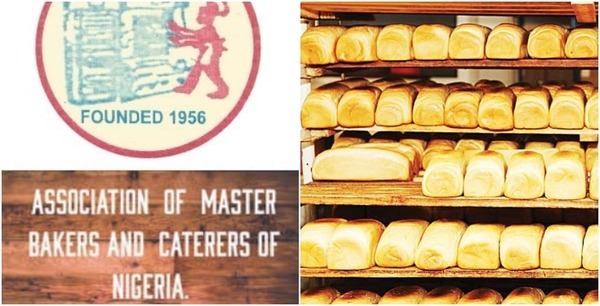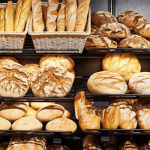The Association of Master Bakers and Caterers of Nigeria in Lagos State have lamented the incessant increase in prices of flour in the country.
At a press briefing in Lagos, the bakers called for urgent interventions and warned that shutdown of bakeries due to high production costs, would exacerbate hunger and unemployment rate in the country.
Popular staple foods such as semolina, bread, noodles and pasta are produced from wheat or durum flour.
They form regular meals in most households in urban and rural communities across the country.
But rising costs of food items in the country is taking them out of the reach of most people.
In July, 2024, the Federal Government announced the approval of a 150-day duty-free window to allow importation of wheat, maize and husked brown rice into the country.
The decision, effective from the 1st of August, 2024, is part of measures to cut rising food inflation across the country.
The purpose of the action by the Federal Government is to bring down the prices of food items in the market and make them more accessible and affordable for the masses.
The Association of Master Bakers and Caterers of Nigeria commended the move by the Federal Government to combat rising food inflation in the country.
At a press briefing in Lagos, officials of the association however raised concerns over lack of implementation of the prices by flour millers.
The association also assured Nigerians that the price of bread will reduce, if the cost of flour is brought down.
They proposed a reduction to 30,000 naira per bag.
TVC News crew visited a bakery in Agege, Lagos, to get firsthand information about some materials used in the production of bread.
The crew also conducted a market survey to ascertain profits made by bakers.
This baker says more government intervention is needed.
To stay ahead of the curve, every business in Nigeria may need to stretch its resources to ensure operational efficiency.
More so, stakeholders in the flour milling industry have to work in collaboration with bakers in order to stay competitive with other staple food producers.
The Association of Master Bakers and Caterers of Nigeria in Lagos State have lamented the incessant increase in prices of flour in the country.
At a press briefing in Lagos, the bakers called for urgent interventions and warned that shutdown of bakeries due to high production costs, would exacerbate hunger and unemployment rate in the country.
Popular staple foods such as semolina, bread, noodles and pasta are produced from wheat or durum flour.
They form regular meals in most households in urban and rural communities across the country.
But rising costs of food items in the country is taking them out of the reach of most people.
In July, 2024, the Federal Government announced the approval of a 150-day duty-free window to allow importation of wheat, maize and husked brown rice into the country.
The decision, effective from the 1st of August, 2024, is part of measures to cut rising food inflation across the country.
The purpose of the action by the Federal Government is to bring down the prices of food items in the market and make them more accessible and affordable for the masses.
The Association of Master Bakers and Caterers of Nigeria commended the move by the Federal Government to combat rising food inflation in the country.
At a press briefing in Lagos, officials of the association however raised concerns over lack of implementation of the prices by flour millers.
The association also assured Nigerians that the price of bread will reduce, if the cost of flour is brought down.
They proposed a reduction to 30,000 naira per bag.
TVC News crew visited a bakery in Agege, Lagos, to get firsthand information about some materials used in the production of bread.
The crew also conducted a market survey to ascertain profits made by bakers.
This baker says more government intervention is needed.
To stay ahead of the curve, every business in Nigeria may need to stretch its resources to ensure operational efficiency.
More so, stakeholders in the flour milling industry have to work in collaboration with bakers in order to stay competitive with other staple food producers.
The Association of Master Bakers and Caterers of Nigeria in Lagos State have lamented the incessant increase in prices of flour in the country.
At a press briefing in Lagos, the bakers called for urgent interventions and warned that shutdown of bakeries due to high production costs, would exacerbate hunger and unemployment rate in the country.
Popular staple foods such as semolina, bread, noodles and pasta are produced from wheat or durum flour.
They form regular meals in most households in urban and rural communities across the country.
But rising costs of food items in the country is taking them out of the reach of most people.
In July, 2024, the Federal Government announced the approval of a 150-day duty-free window to allow importation of wheat, maize and husked brown rice into the country.
The decision, effective from the 1st of August, 2024, is part of measures to cut rising food inflation across the country.
The purpose of the action by the Federal Government is to bring down the prices of food items in the market and make them more accessible and affordable for the masses.
The Association of Master Bakers and Caterers of Nigeria commended the move by the Federal Government to combat rising food inflation in the country.
At a press briefing in Lagos, officials of the association however raised concerns over lack of implementation of the prices by flour millers.
The association also assured Nigerians that the price of bread will reduce, if the cost of flour is brought down.
They proposed a reduction to 30,000 naira per bag.
TVC News crew visited a bakery in Agege, Lagos, to get firsthand information about some materials used in the production of bread.
The crew also conducted a market survey to ascertain profits made by bakers.
This baker says more government intervention is needed.
To stay ahead of the curve, every business in Nigeria may need to stretch its resources to ensure operational efficiency.
More so, stakeholders in the flour milling industry have to work in collaboration with bakers in order to stay competitive with other staple food producers.
The Association of Master Bakers and Caterers of Nigeria in Lagos State have lamented the incessant increase in prices of flour in the country.
At a press briefing in Lagos, the bakers called for urgent interventions and warned that shutdown of bakeries due to high production costs, would exacerbate hunger and unemployment rate in the country.
Popular staple foods such as semolina, bread, noodles and pasta are produced from wheat or durum flour.
They form regular meals in most households in urban and rural communities across the country.
But rising costs of food items in the country is taking them out of the reach of most people.
In July, 2024, the Federal Government announced the approval of a 150-day duty-free window to allow importation of wheat, maize and husked brown rice into the country.
The decision, effective from the 1st of August, 2024, is part of measures to cut rising food inflation across the country.
The purpose of the action by the Federal Government is to bring down the prices of food items in the market and make them more accessible and affordable for the masses.
The Association of Master Bakers and Caterers of Nigeria commended the move by the Federal Government to combat rising food inflation in the country.
At a press briefing in Lagos, officials of the association however raised concerns over lack of implementation of the prices by flour millers.
The association also assured Nigerians that the price of bread will reduce, if the cost of flour is brought down.
They proposed a reduction to 30,000 naira per bag.
TVC News crew visited a bakery in Agege, Lagos, to get firsthand information about some materials used in the production of bread.
The crew also conducted a market survey to ascertain profits made by bakers.
This baker says more government intervention is needed.
To stay ahead of the curve, every business in Nigeria may need to stretch its resources to ensure operational efficiency.
More so, stakeholders in the flour milling industry have to work in collaboration with bakers in order to stay competitive with other staple food producers.
The Association of Master Bakers and Caterers of Nigeria in Lagos State have lamented the incessant increase in prices of flour in the country.
At a press briefing in Lagos, the bakers called for urgent interventions and warned that shutdown of bakeries due to high production costs, would exacerbate hunger and unemployment rate in the country.
Popular staple foods such as semolina, bread, noodles and pasta are produced from wheat or durum flour.
They form regular meals in most households in urban and rural communities across the country.
But rising costs of food items in the country is taking them out of the reach of most people.
In July, 2024, the Federal Government announced the approval of a 150-day duty-free window to allow importation of wheat, maize and husked brown rice into the country.
The decision, effective from the 1st of August, 2024, is part of measures to cut rising food inflation across the country.
The purpose of the action by the Federal Government is to bring down the prices of food items in the market and make them more accessible and affordable for the masses.
The Association of Master Bakers and Caterers of Nigeria commended the move by the Federal Government to combat rising food inflation in the country.
At a press briefing in Lagos, officials of the association however raised concerns over lack of implementation of the prices by flour millers.
The association also assured Nigerians that the price of bread will reduce, if the cost of flour is brought down.
They proposed a reduction to 30,000 naira per bag.
TVC News crew visited a bakery in Agege, Lagos, to get firsthand information about some materials used in the production of bread.
The crew also conducted a market survey to ascertain profits made by bakers.
This baker says more government intervention is needed.
To stay ahead of the curve, every business in Nigeria may need to stretch its resources to ensure operational efficiency.
More so, stakeholders in the flour milling industry have to work in collaboration with bakers in order to stay competitive with other staple food producers.
The Association of Master Bakers and Caterers of Nigeria in Lagos State have lamented the incessant increase in prices of flour in the country.
At a press briefing in Lagos, the bakers called for urgent interventions and warned that shutdown of bakeries due to high production costs, would exacerbate hunger and unemployment rate in the country.
Popular staple foods such as semolina, bread, noodles and pasta are produced from wheat or durum flour.
They form regular meals in most households in urban and rural communities across the country.
But rising costs of food items in the country is taking them out of the reach of most people.
In July, 2024, the Federal Government announced the approval of a 150-day duty-free window to allow importation of wheat, maize and husked brown rice into the country.
The decision, effective from the 1st of August, 2024, is part of measures to cut rising food inflation across the country.
The purpose of the action by the Federal Government is to bring down the prices of food items in the market and make them more accessible and affordable for the masses.
The Association of Master Bakers and Caterers of Nigeria commended the move by the Federal Government to combat rising food inflation in the country.
At a press briefing in Lagos, officials of the association however raised concerns over lack of implementation of the prices by flour millers.
The association also assured Nigerians that the price of bread will reduce, if the cost of flour is brought down.
They proposed a reduction to 30,000 naira per bag.
TVC News crew visited a bakery in Agege, Lagos, to get firsthand information about some materials used in the production of bread.
The crew also conducted a market survey to ascertain profits made by bakers.
This baker says more government intervention is needed.
To stay ahead of the curve, every business in Nigeria may need to stretch its resources to ensure operational efficiency.
More so, stakeholders in the flour milling industry have to work in collaboration with bakers in order to stay competitive with other staple food producers.
The Association of Master Bakers and Caterers of Nigeria in Lagos State have lamented the incessant increase in prices of flour in the country.
At a press briefing in Lagos, the bakers called for urgent interventions and warned that shutdown of bakeries due to high production costs, would exacerbate hunger and unemployment rate in the country.
Popular staple foods such as semolina, bread, noodles and pasta are produced from wheat or durum flour.
They form regular meals in most households in urban and rural communities across the country.
But rising costs of food items in the country is taking them out of the reach of most people.
In July, 2024, the Federal Government announced the approval of a 150-day duty-free window to allow importation of wheat, maize and husked brown rice into the country.
The decision, effective from the 1st of August, 2024, is part of measures to cut rising food inflation across the country.
The purpose of the action by the Federal Government is to bring down the prices of food items in the market and make them more accessible and affordable for the masses.
The Association of Master Bakers and Caterers of Nigeria commended the move by the Federal Government to combat rising food inflation in the country.
At a press briefing in Lagos, officials of the association however raised concerns over lack of implementation of the prices by flour millers.
The association also assured Nigerians that the price of bread will reduce, if the cost of flour is brought down.
They proposed a reduction to 30,000 naira per bag.
TVC News crew visited a bakery in Agege, Lagos, to get firsthand information about some materials used in the production of bread.
The crew also conducted a market survey to ascertain profits made by bakers.
This baker says more government intervention is needed.
To stay ahead of the curve, every business in Nigeria may need to stretch its resources to ensure operational efficiency.
More so, stakeholders in the flour milling industry have to work in collaboration with bakers in order to stay competitive with other staple food producers.
The Association of Master Bakers and Caterers of Nigeria in Lagos State have lamented the incessant increase in prices of flour in the country.
At a press briefing in Lagos, the bakers called for urgent interventions and warned that shutdown of bakeries due to high production costs, would exacerbate hunger and unemployment rate in the country.
Popular staple foods such as semolina, bread, noodles and pasta are produced from wheat or durum flour.
They form regular meals in most households in urban and rural communities across the country.
But rising costs of food items in the country is taking them out of the reach of most people.
In July, 2024, the Federal Government announced the approval of a 150-day duty-free window to allow importation of wheat, maize and husked brown rice into the country.
The decision, effective from the 1st of August, 2024, is part of measures to cut rising food inflation across the country.
The purpose of the action by the Federal Government is to bring down the prices of food items in the market and make them more accessible and affordable for the masses.
The Association of Master Bakers and Caterers of Nigeria commended the move by the Federal Government to combat rising food inflation in the country.
At a press briefing in Lagos, officials of the association however raised concerns over lack of implementation of the prices by flour millers.
The association also assured Nigerians that the price of bread will reduce, if the cost of flour is brought down.
They proposed a reduction to 30,000 naira per bag.
TVC News crew visited a bakery in Agege, Lagos, to get firsthand information about some materials used in the production of bread.
The crew also conducted a market survey to ascertain profits made by bakers.
This baker says more government intervention is needed.
To stay ahead of the curve, every business in Nigeria may need to stretch its resources to ensure operational efficiency.
More so, stakeholders in the flour milling industry have to work in collaboration with bakers in order to stay competitive with other staple food producers.














